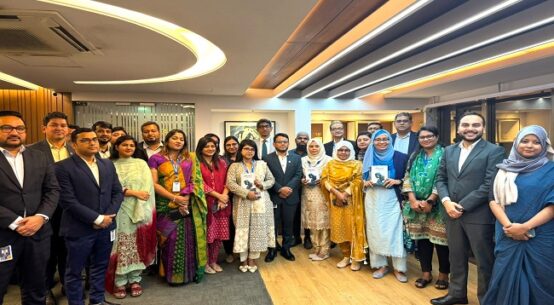The Media, Communication, and Journalism (MCJ) program of North South University (NSU) and DW Akademie jointly organised the two-day 9th CJEN (Communication and Journalism Educators Network) Bangladesh Networking Conference, titled “Breaking Boundaries: Gen-Z, Digital Transformation, and New Journalism Education Approaches,” at NSU. The event brought together leading academics, journalists, and media professionals across the region to discuss transformative approaches to journalism education in a rapidly evolving media landscape.
The inaugural session of the conference was held today at the Syndicate Hall. Dr. Towfique E Elahi, Associate Professor of Media, Communication, and Journalism (MCJ) program at NSU and the Convenor 9th CJEN Network Conference, warmly welcomed participants and outlined the event’s objectives, emphasising the need for innovation and collaboration in journalism education.
Shafiqul Alam, Press Secretary to the Chief Adviser, was presented as the chief guest. He said, “July-August, a mass uprising, I think, is the finest journalistic achievement of this country. Bangladeshi Journalism has evolved brilliantly. However, we have faced problems for the last 15 years, and censorship has been a big concern. Some national and international outlets are doing a great job. But they had constraints.” He added modern journalism’s challenges, including the importance of fact-checking and curating accurate news. He criticised the former government’s control over the media through agencies like DGFI and NSI while reaffirming the interim government’s commitment to press freedom.
Jude W.R. Genilo, PhD, Professor at the Department of Media Studies and Journalism at ULAB and International Consultant at DW Akademie, provided an insightful appraisal of the conference theme, discussing the intersections of digital transformation and journalism education. He said, “We gather to discuss the future of journalism education, which is standing at a crossroads. The new generation’s energy has reshaped not only the political landscape but also the foundations of how we approach information, storytelling, and ethical communication.”
Special guest Professor SK Tawfique M Haque, Director of the South Asian Institute of Policy and Governance (SIPG), highlighted the challenges faced by journalism during the July Revolution, including issues such as inadequate compensation and the growing lack of role models in the field in recent years and Dr. Md. Rizwanul Islam, Dean of the School of Humanities and Social Sciences, NSU spoke about the evolving role of journalism and emphasised the importance of disseminating the knowledge and insights gained from this conference.
Carsten Von Nahmen, Managing Director of DW Akademie, captivated the audience with a video message in his keynote speech on media innovation and educating young people for the future of journalism.
The inaugural session concluded with remarks from the session chair, Professor Abdur Rob Khan, NSU’s Treasurer & Pro-Vice-Chancellor (IC). Dr. Rizwan Khair, Chair of the Department of Political Science and Sociology, gave a vote of thanks.

